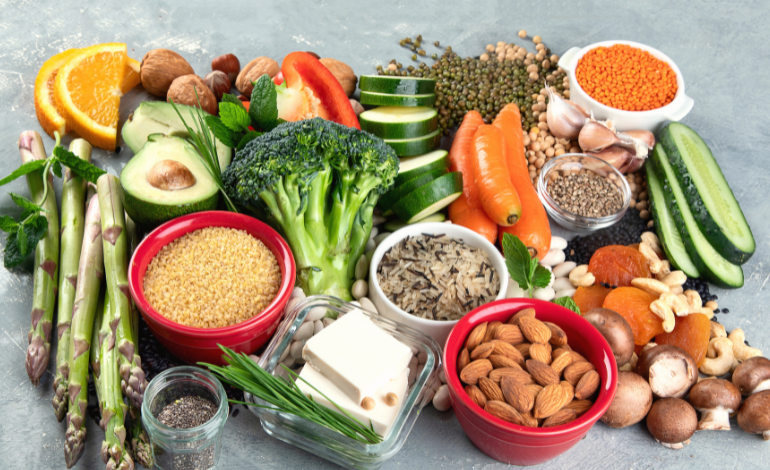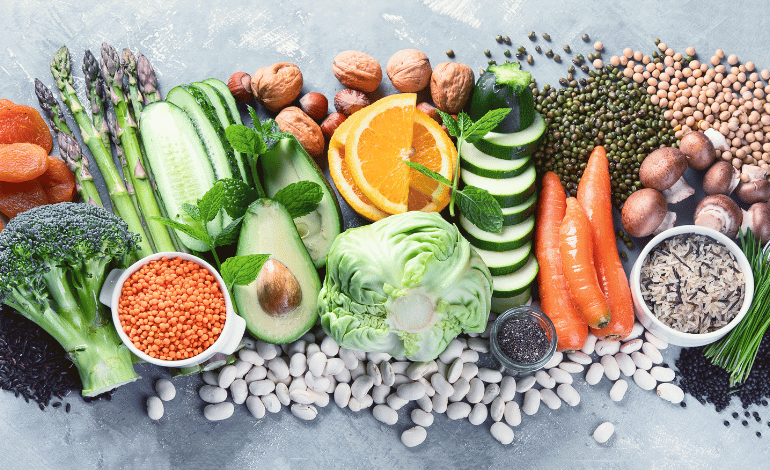Plant-Based Diet for Health and Weight Loss

Plant-Based Diet for Health and Weight Loss: Plant-based diet have gained immense popularity in recent years, thanks to the growing awareness of their potential health benefits. More people are shifting towards a plant-based lifestyle not only to promote animal welfare and sustainability but also to improve their own health. Among the many health benefits associated with a plant-based diet, weight loss and overall health improvement stand out.
In this article, we’ll explore the benefits of a plant-based diet and how it can help you achieve your health and weight loss goals.
What is a Plant-Based Diet?
A plant-based diet is a diet that emphasizes whole, minimally processed foods that come from plants, such as fruits, vegetables, whole grains, legumes, nuts, and seeds. This diet also limits or eliminates animal products such as meat, poultry, fish, dairy, and eggs.
Plant-based diet can be divided into different categories based on the extent to which animal products are restricted. For example, a vegan diet eliminates all animal products, while a vegetarian diet allows for the consumption of dairy and eggs.
There are many health benefits associated with a plant-based diet, including a lower risk of chronic diseases such as heart disease, type 2 diabetes, and some forms of cancer. Additionally, plant-based diets are often more sustainable and environmentally friendly than diets that rely heavily on animal products.
Benefits of Eating Plant-based diets
Benefits of eating a plant-based diet are:
Reduced risk of chronic diseases: A plant-based diet has been associated with a lower risk of chronic diseases such as heart disease, type 2 diabetes, and certain types of cancer.
Weight management: Plant-based diets are typically lower in calories and higher in fiber than diets that include meat and other animal products, which can help with weight management.
Improved digestion: Plant-based diets are typically high in fiber, which can help promote healthy digestion and prevent constipation.
Better gut health: Plant-based diets have been shown to promote the growth of healthy gut bacteria, which can improve overall gut health.
Environmental sustainability: Animal agriculture is a major contributor to greenhouse gas emissions and deforestation, and a plant-based diet can help reduce your environmental impact.
Ethical considerations: For those who are concerned about animal welfare, a plant-based diet can be a way to avoid contributing to the suffering of animals raised for food.
Overall, a plant-based diet can provide a range of health benefits and may be a good choice for those looking to improve their health, reduce their environmental impact, or make ethical choices about their food consumption.
How Plant Based diet promotes Weight Loss?
One of the main benefits of a plant-based diet is weight loss. Plant-based foods tend to be lower in calories and higher in fiber compared to animal-based foods. This means you can eat more food for fewer calories, which can help you feel full and satisfied without overeating. A study published in the Journal of the Academy of Nutrition and Dietetics found that people who followed a vegan diet for 18 weeks lost an average of 9.3 pounds, compared to 4.2 pounds in those who followed a standard American diet.
Plant-based diets can promote weight loss in several ways:
High fiber content: Plant-based diets are typically high in fiber, which helps to increase satiety and reduce hunger. This can lead to a reduction in overall calorie intake, which can contribute to weight loss. For example, a cup of cooked lentils contains about 16 grams of fiber, which is more than half of the recommended daily intake for an adult.
Low in calorie density: Plant-based diets tend to be lower in calorie density compared to diets that include meat and other animal products. This means that you can eat more food for fewer calories, which can help with weight loss. For example, a cup of cooked broccoli contains only 55 calories, while a cup of cooked ground beef contains about 300 calories.
Nutrient-dense foods: Plant-based diets are often rich in nutrient-dense foods such as fruits, vegetables, and whole grains, which provide important vitamins, minerals, and antioxidants. These foods can help to support overall health while also promoting weight loss. For example, a cup of cooked quinoa provides about 8 grams of protein and is also rich in fiber, iron, and magnesium.
Reduced intake of unhealthy fats: Plant-based diets tend to be low in unhealthy saturated and trans fats, which can contribute to weight gain and other health problems. By reducing the intake of these types of fats, plant-based diets can promote weight loss and overall health. For example, replacing high-fat dairy products with plant-based alternatives like almond milk or tofu can reduce the intake of saturated fats.
Reduced consumption of processed foods: Plant-based diets often involve eating whole, unprocessed foods which are often more nutrient-dense than processed foods. By choosing to eat more whole foods, you may be able to increase your intake of vitamins, minerals, and other important nutrients that your body needs to function properly. Processed foods are often high in calories and low in nutrients. By reducing your intake of processed foods, you are likely to consume fewer calories overall, which can lead to weight loss.
Conclusion
In conclusion, a plant-based diet can be an effective approach for weight loss due to its emphasis on whole, unprocessed foods. By reducing the intake of processed foods and increasing the consumption of fruits, vegetables, legumes, whole grains, and nuts, individuals can lower calorie intake, increase satiety, improve insulin sensitivity, and reduce inflammation. Plant-based diets have also been associated with improved health outcomes, including reduced risk of chronic diseases such as heart disease, diabetes, and certain cancers. However, it is important to ensure that a plant-based diet provides adequate nutrients, especially protein, iron, calcium, and vitamin B12, which can be more challenging to obtain from plant-based sources alone.
FAQS
Q1. Are plant-based diets more effective for weight loss than other diets?
Ans. Plant-based diets have been shown to be effective for weight loss, but they may not necessarily be more effective than other diets. The key to weight loss is creating a calorie deficit, which can be achieved through various dietary approaches.
Q2. Can a plant-based diet provide enough protein for weight loss?
Ans. Yes, plant-based diets can provide enough protein for weight loss. Sources of plant-based protein include legumes, nuts, seeds, tofu, tempeh, and whole grains. It is important to consume a variety of these foods to ensure adequate protein intake.
Q3. Can a plant-based diet provide enough nutrients for weight loss?
Ans. Yes, a plant-based diet can provide all the necessary nutrients for weight loss, but it is important to ensure that the diet is nutritionally balanced. Some nutrients that may require special attention on a plant-based diet include iron, calcium, vitamin B12, and omega-3 fatty acids.
Q4. Can I lose weight on a plant-based diet if I still eat processed foods?
Ans. While reducing processed foods is generally recommended for weight loss, it is still possible to lose weight on a plant-based diet if you consume processed foods in moderation and ensure that your overall calorie intake is in a deficit.
Q5. How quickly can I expect to lose weight on a plant-based diet?
Ans. The rate of weight loss on a plant-based diet will vary depending on factors such as starting weight, calorie intake, physical activity level, and individual metabolism. In general, a healthy rate of weight loss is 1-2 pounds per week.








